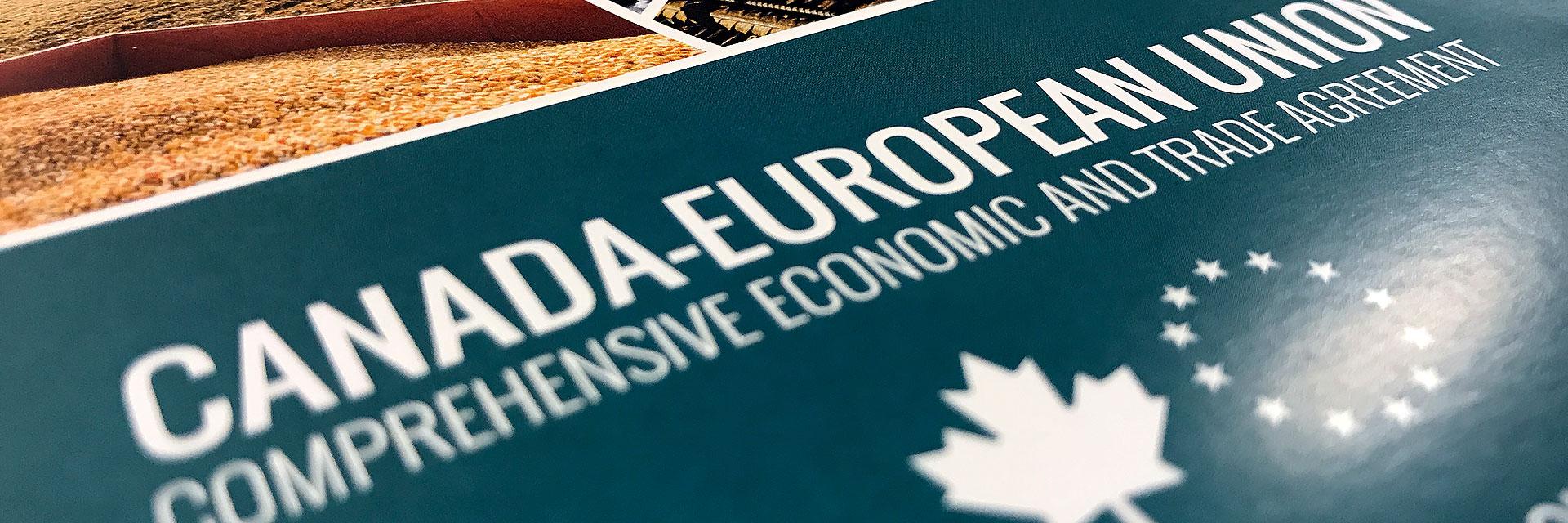10 Questions with a CETA Expert: Sanjeev Chowdhury
Tuesday, February 27, 2018
By now, you’ve heard all about the Comprehensive Economic Trade Agreement (or CETA) between Canada and the European Union.
CETA is changing the global business landscape for two of the world’s largest economies — Canada and the EU. Canadian businesses of all sizes and from all sectors can access the European market like never before. But what does this mean for Nova Scotia companies, and how can we take advantage of the province’s proximity to the EU, cultural similarities, and this new free trade opportunity to grow Nova Scotia businesses? To answer these questions, we talked to Sanjeev Chowdhury, Director of the Free Trade Agreement Promotion Task Force at Global Affairs Canada.
Q: Europe's market is incredibly diverse. How do you suggest small companies get started with an export plan?
A: First-time exporters may find the process daunting at first, but it doesn’t have to be. There are many services, most of which are free, the provincial and federal governments offer to help small- and medium-sized enterprises (SMEs) develop a robust export plan before they go to a foreign market like the EU. The Canadian Trade Commissioner Service (tradecommissioner.gc.ca, represented through our regional office in Halifax) provides Canadian companies with practical advice on foreign markets and on-the-ground intelligence to help them make informed business decisions. Other national and local organizations, such as Nova Scotia Business Inc., Export Development Canada, Business Development Bank of Canada, Canadian Commercial Corporation and the Atlantic Canada Opportunities Agency, provide advice and assistance to businesses looking for help in understanding government programs that support exporters in their international business endeavours abroad.
Sanjeev Chowdhury recently spoke at a CETA Seminar and Business Forum in Halifax. The event was part of The Atlantic Trade and Investment Growth Strategy, a collaborative, pan-Atlantic approach aiming to help Atlantic businesses begin exporting, increase their export sales, expand to new markets, and create global partnerships. See video coverage of the event.
Q: Is there a common myth regarding doing business in Europe?
A: Many people believe that one point of entry in the EU is just like any other. In reality, the EU comprises 28 different Member States, each with their own specificities and unique tastes. What might sell well in one Member State could be of little interest in another; making informed choices about which markets to enter is critical to attaining export success. The Trade Commissioner Service and its partners have a wealth of market intelligence to help you target your business plans overseas.
Q: Are there any surprising differences between North American customers and European customers?
A: European consumers expect good quality products at fair prices. Canadian products are generally considered to be of higher quality than those from other import markets but have historically held higher price tags due to duties levied upon importation. Under CETA, most of those tariffs are now gone, giving Canadian producers a more competitive advantage to uphold the reputation.
Q: For those who don't know where to get started, what's the best first step to take?
A: Helping companies take advantage of CETA is a major priority of Canada’s Minister of International Trade, the Hon. François-Philippe Champagne. The Trade Commissioner Service can help you find importers and connect you with business partners in the EU, including partners specific to your particular sector(s). If you have never exported before, consider talking to another local business that has previous experience. Personal testimonials offer an honest account of what challenges and rewards await in a foreign market. Finally, contact the Trade Commissioner Service for tips and other tools of the trade. We have trade commissioners located in the major cities of each Atlantic province with a first-hand understanding of doing business internationally -- the Trade Commissioner Service can give you the assistance you need to prosper in the EU and there is no cost for our services.
Q: What sectors or industries do you see the greatest opportunity in?
A: CETA is a progressive free-trade agreement that covers all aspects of Canada-EU trade, and all sectors of the Canadian economy can benefit from this ambitious deal. Global Affairs Canada has nevertheless specifically targeted twelve sectors which may hold the most promise for companies ready to enter or expand in the European market, namely:
- Aerospace
- Agriculture and agri-food
- Automotive
- Clean tech
- Fish and seafood
- Forestry
- Information Communications Technology
- Infrastructure
- Medical devices
- Metals, mining and minerals
- Oil and gas
- Pharmaceuticals
Q: What's the biggest hurdle that companies should prepare for when exporting to Europe?
A: The EU is a very promising foreign market for Canadian businesses and CETA’s benefits make expanding to Europe easier than ever before, but there are few non-CETA factors that potential exporters need to consider before going to market. These factors include Member State-specific value-added tax (VAT) obligations, certifications and labelling requirements including CE markings, and the newly announced EU-wide General Data Protection Regulation.
Q: What makes CETA such an important opportunity for businesses?
A: One in six jobs in the Canadian labour force is related to exports. Under CETA, Canadians now have easier access to the world’s largest integrated economy encompassing more than 510 million new consumers with unique tastes. CETA will increase jobs, strengthen economic relations and promote new business opportunities for businesses on both sides of the Atlantic. Since coming into effect on September 21, 2017, 98 percent of tariff lines have already been eliminated on merchandise traded between Canada and the EU, while select products will see their tariffs gradually drop to zero over the next seven years. The benefits are just waiting to be realized.
Q: What makes Nova Scotia uniquely positioned for success?
A: As a native Haligonian myself, I understand the risks and challenges that Nova Scotians face when exporting to an unknown territory. But did you know that the EU is already Nova Scotia’s second-largest export destination and second-largest trading partner? Nova Scotia is well-positioned for increased trade with the EU under CETA, in large part thanks to its geographic proximity. The Port of Halifax is two days closer to Europe than any other port in North America, giving Nova Scotian businesses preferential maritime access to the EU by ensuring delivery of fresher, higher quality products across the pond.
Q: Is there anything else you’d like companies to keep in mind about CETA?
A: CETA is the first of a new generation of free trade agreements because it makes progressive provisions and commitments. Progressive trade means doing everything possible to ensure all segments of society, both in Canada and abroad, can take advantage of the economic opportunities flowing from trade and investment. CETA was not negotiated with only the “big leagues” in mind -- it was made to enhance and strengthen our middle class and the people who work hard to join it, including women, youth and indigenous entrepreneurs.
Is growing your business part of your resolutions for 2018? Nova Scotia Business Inc. is here to help, providing resources such as an Exporter Self-Assessment Tool and relevant Export Development Education.





